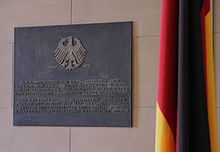Museum Koenig Bonn
After his father died in 1903, Alexander Koenig planned a natural history museum to present his private collection to the public.After the outbreak of World War I in 1914, the uncompleted building was confiscated and used as a military hospital and later, until 1923, as barracks by the French occupying forces.Alexander Koenig, who had lost most of his fortune in the aftermath of the war, donated the museum and his private collection to the German government in 1929.It shows complex ecological systems through dioramas of the African Savannah, a tropical rain forests, the polar regions, deserts and Central Europe.The main building of the Museum Koenig houses the public exhibition and features a large central hall crowned by a glass roof.The building is named after Clas Michael Naumann, professor of zoology at the University of Bonn and former director of the museum.




Bonn, North Rhine-WestphaliaMuseum Koenignatural history museumzoologicalAlexander KoenigLeibniz AssociationParlamentarischer RatBundeshausArcticWorld War IWorld War IIWest GermanyChancellor's OfficeKonrad AdenauerLeonerasaurusMuseum of Natural HistoryvertebrateUniversity of BonnarthropodHans Edmund WoltersWayback MachineDeutsche Sammlung von Mikroorganismen und ZellkulturenGerman Maritime MuseumGerman Mining MuseumMuseum für NaturkundeRömisch-Germanisches ZentralmuseumSenckenberg Nature Research SocietyCentre for Contemporary HistoryCentre for Tropical Marine EcologyDagstuhlFerdinand-Braun-InstitutGerman Institute for Economic ResearchGerman Institute for Global and Area StudiesGerman Research Institute for Public AdministrationGESIS – Leibniz Institute for the Social SciencesIfo Institute for Economic ResearchInnovations for High Performance MicroelectronicsInstitut für KristallzüchtungKiel Institute for the World EconomyLeibniz Institute for Astrophysics PotsdamLeibniz Institute for Baltic Sea ResearchLeibniz Institute for Educational Media | Georg Eckert InstituteLeibniz Institute for NeurobiologyLeibniz Institute for Science and Mathematics Education at the University of KielLeibniz Institute of Agricultural Development in Central and Eastern EuropeLeibniz-Institut für Festkörper- und WerkstoffforschungLeibniz-Institut für Molekulare PharmakologieMathematical Research Institute of OberwolfachGerman National Library of EconomicsResearch Center BorstelRWI EssenSocio-Economic PanelWZB Berlin Social Science CenterBonn Graduate School of EconomicsBonn-Cologne Graduate School of Physics and AstronomyCenter for European Integration StudiesGerman Center for Neurodegenerative DiseasesMax Planck Institute for Neurobiology of Behavior – caesarMax Planck Institute for Radio AstronomyMax Planck Institute for Research on Collective GoodsMax Planck Institute for MathematicsAkademisches KunstmuseumBonn Egyptian MuseumArithmeumBotanical GardenKatholischer Studentenverein Arminia BonnWissenschaftlicher Katholischer Studentenverein Unitas Stolzenfels zu BonnGreifswald International Students' FestivalNordischer KlangList of University of Bonn people